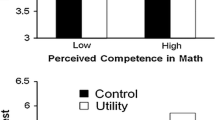Abstract
Male and female college students, divided according to levels of achievement motivation, were asked to do an anagram task at which their success or failure was determined by experimental manipulation of the problems they were given. Their ratings of ability, effort, task difficulty, and luck as possible causes for success or failure indicated that those with high achievement motivation of both sexes made relatively higher ratings for ability and lower ratings for task difficulty. Females tended to employ higher ratings for luck, and females with high achievement motivation made maximal use of effort as a causal factor. Theoretical implications and potential applications of these data are discussed.
Similar content being viewed by others
References
Bar-Tal, D. Individual differences and attributional analysis of achievement-related behavior (Publication No. 1975/17). Pittsburgh: University of Pittsburgh, Learning Research and Development Center, 1975.
Bird, C. Born female: The high cost of keeping women down. New York: David McKay, 1968.
Broverman, I. K., Vogel, S. R., Broverman, D. M., Clarkson, F. E., & Rosenkrantz, P. S. Sex-role stereotypes: A current appraisal. Journal of Social Issues, 1972, 28, 59–78.
Epstein, C. F. Woman's place: Options and limits in professional careers. Berkeley: University of California Press, 1971.
Feather, N. T. Attribution of responsibility and valence of success and failures in relation to initial confidence and task performance. Journal of Personality and Social Psychology, 1969, 13, 129–144.
Feldman-Summers, S. A., & Kiesler, S. B. Those who are number two try harder: The effect of sex on attributions of causality. Journal of Personality and Social Psychology, 1974, 30, 846–855.
Frieze, I. Studies of information processing and the attributional process. Unpublished doctoral dissertation, University of California, Los Angeles, 1973.
Frieze, I. Women's expectations for and causal attributions of success and failure. In M. Mednick, S. Tangri, & L. Hoffman (Eds.), Women and achievement: Social and motivational analyses. Washington, D.C.: Hemisphere Publishing Corporation, 1975.
Frieze, I. Causal attributions and information seeking to explain success and failure. Journal of Research in Personality, in press.
Frieze, I. H., Fisher, J., Hanusa, B., McHugh, M., & Valle, V. A. Attributions of success and failure as internal and external barriers to achievement in women. In J. Sherman and F. Denmark (Eds.), Psychology of women: Future of research. New York: Psychological Dimensions, in press.
Kukla, A. Attributional determinants of achievement-related behavior. Journal of Personality and Social Psychology, 1972, 21, 166–174. (a)
Kukla, A. Foundations of an attributional theory of performance. Psychological Review, 1972, 79, 454–470. (b)
McMahan, I. D. Relationship between causal attributions and expectancy of success. Journal of Personality and Social Psychology, 1973, 28, 108–114.
Mehrabian, A. Measures of achieving tendency. Educational and Psychological Measurement, 1969, 29, 445–451.
Nichols, J. Causal attributions and other achievement-related cognitions: Effects of task, outcome, attainment value, and sex. Journal of Personality and Social Psychology, 1975, 31, 379–389.
Rosenbaum, R. M. A dimensional analysis of the perceived causes of success and failure. Unpublished doctoral dissertation, University of California, Los Angeles, 1972.
Simon, J. G., & Feather, N. T. Causal attributions for success and failure at university examinations. Journal of Educational Psychology, 1973, 64, 46–56.
Weiner, B. Theories of motivation. Chicago: Markham Publishing Company, 1972.
Weiner, B. Achievement motivation and attribution theory. Morristown, N. J.: General Learning Press, 1974.
Weiner, B., Frieze, I., Kukla, A., Reed, L., Rest, S. A., & Rosenbaum, R. M. Perceiving the causes of success and failure. New York: General Learning Press, 1971.
Weiner, B., Heckhausen, H., Meyer, W. U., & Cook, R. E. Causal ascriptions and achievement motivation: A conceptual analysis of effort and reanalysis of locus of control. Journal of Personality and Social Psychology, 1972, 21, 239–248.
Weiner, B., & Kukla, A. An attributional analysis of achievement motivation. Journal of Personality and Social Psychology, 1970, 15, 1–20.
Weiner, B., & Potepan, P. A. Personality correlates and affective reactions towards exams of succeeding and failing college students. Journal of Educational Psychology, 1970, 61, 144–151.
Author information
Authors and Affiliations
Additional information
The research reported herein was supported by the Learning Research and Development Center, supported in part as a research and development center by funds from the National Institute of Education (NIE), United States Department of Health, Education, and Welfare. The opinions expressed do not necessarily reflect the position or policy of NIE and no official endorsement should be inferred. The authors would like to thank Allan LaVoie for his helpful comments on an earlier version of this manuscript and Chuck Block and Tom Werner for their enthusiastic help in carrying out the details of this study. The authors wish also to extend their appreciation to Yaffa Bar-Tal for her assistance in all phases of the study. The senior author is now at the School of Education, Tel Aviv University, Tel Aviv, Israel.
Rights and permissions
About this article
Cite this article
Bar-Tal, D., Frieze, I.H. Achievement motivation for males and females as a determinant of attributions for success and failure. Sex Roles 3, 301–313 (1977). https://doi.org/10.1007/BF00287617
Issue Date:
DOI: https://doi.org/10.1007/BF00287617



